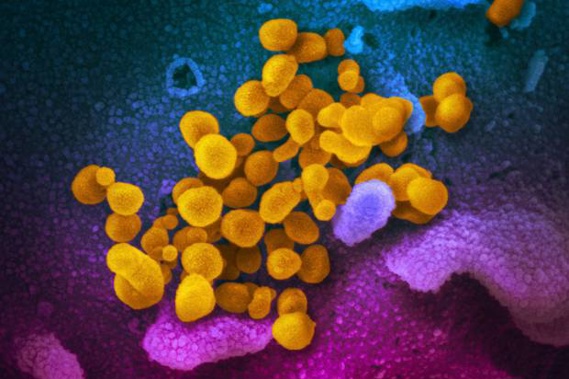
It's infected nearly half a million people worldwide and killed almost 22,000. How can scientists hope to stop the monster threat that is Covid-19? One of New Zealand's most respected scientists - the University of Auckland's Professor Peter Shepherd, who has helped develop new drugs to treat diseases - talked to Herald science reporter Jamie Morton.
Why is this virus so tough to beat? How far away is a vaccine at this stage - and why is it such a lengthy and complex process to create one?
Traditional methods of vaccine production for viruses often rely on making large amounts of the virus in a lab, and then inactivating it, so it's not infective, and using it to make a vaccine.
Using these methods of vaccine production takes many, many months.
This is how we make vaccines for influenza at the moment. As we already know a lot about flu, we can predict a year ahead what might be going to happen across the world. We can develop vaccines accordingly and have them ready each year in advance.
This approach is obviously not possible with a virus with so many new features such as Covid-19, so scientists have to start from scratch.
Efforts are well under way. Scientists are using traditional methods and are hopeful these will yield a vaccine. But it may take a year to create one that's shown to be safe, and of which there is enough for a lot of people.
But really, we need something much sooner, and there is hope for this. New scientific techniques are being used to develop vaccines worldwide at a speed never seen before. This uses all of the scientific knowledge our societies have invested in over many years.
So how is the vaccine created?
One key way to make a vaccine is to obtain proteins that are unique to the virus and to use these proteins to generate an immune response in humans.
Since these are unique to the virus, our immune system will recognise them as foreign and will produce antibodies against them. So, when our body sees the virus, the antibodies will attack the virus and destroy it before it can take hold.
Coronaviruses such as Covid-19 carry their genetic code in RNA, rather that DNA, as we do in humans.
But scientists have been able to use gene sequencing technologies to study the Covid-19 RNA and find how its genetic code differs from other types of coronavirus.
This code tells scientists what proteins will be made specifically by the virus - and this is what can be used to help inform development of vaccines.
Scientists can use complex computer algorithms to predict which of these proteins will be most useful in stimulating the human immune system to develop antibodies against the Covid-19 virus.
Even when this is known, the real problem is being able to make enough of these proteins in a lab to allow production of the millions of vaccinations that would be required globally.
To overcome this, some American biotech firms are starting clinical trials using a different approach.
Within the vaccine, they include bits of RNA made in a lab that have the genetic code to make a few of the bits of the proteins from Covid-19 which are unique to the virus, and which are most likely to stimulate the immune system.
It's important to remember this doesn't involve injecting the whole virus - just the genetic code for the bits of protein that are most likely to get our immune system activated.
Once these are in the body, the aim is that it will get into our own cells, and our cells will use this genetic code to make these proteins in large amounts, while not harming our cells.
Since RNA can be made on machines very quickly, this approach to making vaccines offers the possibility of using our knowledge about the virus to design and produce a vaccine very quickly - in just the same way a 3D printer has revolutionised our ability to take a set of plans and make a new object very quickly.
It's a very new technique, but it has shown promise in other types of vaccines, and is worth trying for Covid-19. We have our fingers crossed.
How will a vaccine against Covid-19 actually work?
The world has known about viruses such as influenza for a very long time, and we've had time to understand these quite well and develop good vaccine strategies.
However, there are only a few cases where serious versions of coronaviruses have spread to humans from other animals, so there hasn't been as much effort to develop vaccines against these.
The most dangerous of these other types were the SARS and MERS viruses.
But the outbreaks of these were controlled quite quickly, so interest in vaccines for them waned as other priorities came along to take the very limited health research funding.
However, quite a bit was learnt about how to make vaccines against the corona viruses.
One big focus has been on a protein on Covid-19 that sticks out from its surface and may be useful for making a vaccine.
It is called the "spike" protein and the Covid-19 version of this is reasonably different from the SARS and MERS ones. So we'll have to wait to see how much immune response it generates, and whether just targeting one part of Covid-19 will be enough.
The answer is that we don't really know what's going to work best, and how well it will work.
But rest assured, there are huge numbers of researchers working on a wide range of strategies using a huge amount of accumulated expertise.
We know that people who have had Covid-19 do develop antibodies, although it's not clear how long the response lasts after they recover.
So that means it should be possible to get some form of effect of a vaccine, although whether this will be an ideal one remains to be seen.
However, even if we don't get an ideal long term vaccine for the whole population in these first attempts, there would still be a lot of value in even a vaccine that had shorter term effects.
This is because it could be used to bridge us through to the end of the epidemic to protect frontline health care workers and people in key industries who have to continue going to work.
We've also been hearing a lot about anti-virals assisting with Covid-19 cases. What are these, and how might they help?
Vaccines either direct our body to produce an immune response that neutralises the virus as it circulates or kills off cells that have been infected.
It's the best strategy if possible as it stops the disease before it starts.
However, we don't have a vaccine right now so we have to look at other strategies.
This is where drugs can come in. These are called anti-virals, and these are drugs that can be very useful in slowing the disease once it has started and this increases the chance of the patient surviving the disease.
These anti-viral drugs stop viruses from invading our cells or block the ability of the virus to replicate itself inside our cells.
Very successful anti-viral drugs have been developed for many diseases like hepatitis C, herpes virus and HIV, so we know it can be done if we have enough understanding of how the virus works.
Some of these target key processes that coronavirus also needs to use when it infects cells so many of these are now being tested against Covid-19.
What look to be some of the most promising treatments to date, and why?
To date, the best information we have about what might work in treating Covid-19 in the real world comes mostly from the heroic efforts of Chinese clinicians and scientists who responded very quickly when they saw how dire the disease was.
Since there isn't a vaccine, they have very quickly begun to look at how anti-viral drugs could potentially boost the effectivity of standard treatments that were being used.
For this, they have been using treatments that were developed for other types of viruses but for which there is a rationale that they might also be effective against Covid-19.
More than 100 clinical trials have started over the last three months to look at this, which is an incredible effort that just wouldn't happen in normal times.
Most of the studies are in China, which has had Covid-19 the longest. Some of these trials are starting to report initial results, albeit that the reports are at this stage in a non-peer reviewed form.
Some of the treatments are looking much better than others, and we can look forward to ever more definitive information emerging in coming days and weeks.
However, I think there is reason to believe some of these will be useful for helping in treating the virus
The question will be which of these drugs can we actually get here in New Zealand - or whether we might even have to consider making them for ourselves, using the capabilities available here.
Take your Radio, Podcasts and Music with you









